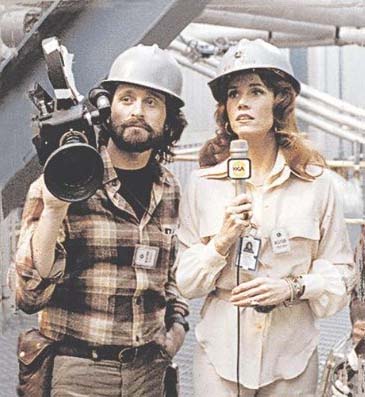As nuclear power tries to make a comeback, maybe this old flick should be revisited by the general public. I only remember its existence as a kid in 1979 because the whole Three Mile Island accident happened after its release. Couldn’t have asked for a better advertising gift then a real nuclear “mishap.” Now if the Chernobyl disaster happened instead, I think it would’ve tanked.
The China Syndrome is personally one of the last major “Don’t Trust Authority-Corporations Can’t be Trusted” films of the Seventies (see Network, The Parallax View, All the President’s Men and Three Days of the Condor). When St. Reagan came to the presidency, Hollywood changed its tune and started making all those movies for people with short attention spans we’re plagued with now.
Its story unfolds like so…Kimberly Wells (Fonda) is an aspiring reporter stuck to doing boring human-interest pieces, striving for a chance to cover the real news. Richard Adams (Douglas) is a freelance cameraman with his own production company but has an attitude against The Man. Together they go out to the local nuclear power plant to do a puff piece about energy. While they’re present in the observation gallery that overlooks the control center…something goes wrong—there wouldn’t be any movie unless it didn’t. Douglas turns on his camera to record everything happening; he had been ordered by the plant’s PR flak to turn it off (character actor James Hampton, you’ll know him when you see him). Overseeing the possible nuclear disaster are Jack Godell (Lemmon) and Ted Spindler (Brimley) who lead the staff into preventing the reactor from going critical and ending in a meltdown. Despite all the assurances from the flak, Wells and Adams aren’t convinced what they saw was “nothing serious.” The TV station’s lawyer refuses to allow Wells and Adams to make a story out of this and orders the footage shelved since the power company could sue them into oblivion. Matters aren’t looking any sunnier for Godell, Spindler and their team as they’re grilled by the NRC (Nuclear Regulatory Commission) and their bosses. This “mishap” could delay the company’s plans to get state approval for building another nuclear plant and there’s pressure from the shareholders to be more profitable, safety be damned.
The rest of the movie unfolds in a rather predictable manner. It’s still interesting thanks to the solid acting of Lemmon. He does a great job as a man torn between his loyalty to nuclear power (it’s his life, his career since he was in the Navy), his dislike of the media for demonizing his work, and his concern for the public’s safety (it does come first). I found Fonda less convincing as a reporter trying to juggle the people’s right to know against her ambition. However, I’m willing to fess up that my judgment of her acting is clouded by my dislike of her in general. I still stand by my statement of saying her acting has always been wooden. From Barbarella on, she’s weak. Douglas is the same. His temperamental, volcanic stuff has always been dull and by 1979, this maverick character type was a cliché anyway. Shortcomings aside, it remains a solid movie in its own right and is the best of the batch: Red Alert or Chernobyl: The Final Warning aren’t terribly scary.

